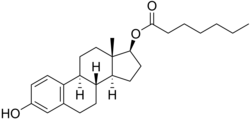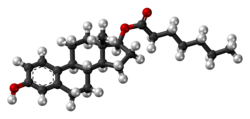- Estradiol levels after the most recent intramuscular injection during once-monthly 5 or 10 mg estradiol enanthate and 75 or 150 mg dihydroxyprogesterone acetophenide contraception in one premenopausal woman each. [43] Assays were performed using radioimmunoassay. [43] Source was Recio et al. (1986). [43]
- Estradiol levels after a single intramuscular injection of 10 mg estradiol enanthate in three postmenopausal women. [7] Assays were performed using radioimmunoassay. [7] Source was Wiemeyer et al. (1986). [7]
- Estradiol and prolactin levels after the most recent intramuscular injection during once-monthly 10 mg estradiol enanthate and 150 mg dihydroxyprogesterone acetophenide contraception in 10 premenopausal women. [54] Only four determinations were made: days 0, 10, 20, and 30. [54] Assays were performed using radioimmunoassay. [54] Source was Garza-Flores et al. (1989). [54]
 | |
 | |
| Clinical data | |
|---|---|
| Trade names | Perlutal, Topasel, Unalmes, Yectames, others |
| Other names | EEn; E2-EN; EE; E2E; Estradiol enanthate; Estradiol heptanoate; SQ-16150 |
| Routes of administration | Intramuscular injection [1] [2] |
| Drug class | Estrogen; Estrogen ester |
| ATC code | |
| Legal status | |
| Legal status |
|
| Pharmacokinetic data | |
| Bioavailability | IM: High |
| Protein binding | Estradiol: ~98% (to albumin and SHBG ) [3] [4] |
| Metabolism | Cleavage via esterases in the liver, blood, and tissues [5] [6] |
| Metabolites | Estradiol, heptanoic acid, and metabolites of estradiol [5] [6] |
| Elimination half-life | IM: 5.6–7.5 days [7] [1] [8] [9] |
| Duration of action | IM (10 mg): ~20–30 days [10] [5] |
| Excretion | Urine [1] |
| Identifiers | |
| |
| CAS Number | |
| PubChem CID | |
| ChemSpider | |
| UNII | |
| KEGG | |
| ChEMBL | |
| CompTox Dashboard (EPA) | |
| ECHA InfoCard | 100.023.272 |
| Chemical and physical data | |
| Formula | C25H36O3 |
| Molar mass | 384.560 g·mol−1 |
| 3D model (JSmol) | |
| |
| |
Estradiol enantate (EEn or E2-EN), also spelled estradiol enanthate and sold under the brand names Perlutal and Topasel among others, is an estrogen medication which is used in hormonal birth control for women. [1] [2] [11] It is formulated in combination with dihydroxyprogesterone acetophenide (DHPA; algestone acetophenide), a progestin, and is used specifically as a combined injectable contraceptive. [1] [2] Estradiol enantate is not available for medical use alone. [12] [13] [14] [15] The medication, in combination with DHPA, is given by injection into muscle once a month. [1] [2]
Contents
- Medical uses
- Available forms
- Contraindications
- Side effects
- Overdose
- Interactions
- Pharmacology
- Pharmacodynamics
- Pharmacokinetics
- Chemistry
- History
- Society and culture
- Generic names
- Brand names
- Availability
- Usage
- See also
- References
Side effects of estradiol enantate include breast tenderness, breast enlargement, nausea, headache, and fluid retention. [16] Estradiol enantate is an estrogen and hence is an agonist of the estrogen receptor, the biological target of estrogens like estradiol. [6] [5] It is an estrogen ester and a long-lasting prodrug of estradiol in the body. [5] [6] Because of this, it is considered to be a natural and bioidentical form of estrogen. [5] [17]
Estradiol enantate was first described by 1954, [18] and was first studied in combination with DHPA as a combined injectable contraceptive in 1964. [19] [20] The combination was introduced for clinical use by the mid-1970s. [21] [22] [23] Estradiol enantate is not available as a standalone medication (i.e., by itself without DHPA). [15] The combination is available in Latin America and Hong Kong, and was also previously marketed in Spain and Portugal. [15] [2] [13]





















